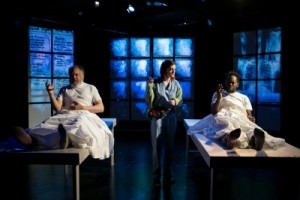
 [rating=4] After the end of a long and immoderately cold winter, many of us are looking forward to hot temperatures, going to the beach, and being outside in general. But its worth remembering that tempers run high in the summer, murder rates can soar, and that extreme heat can also pose life-threatening problems, especially for society’s most vulnerable. Never was this more true than in 1995 when over 700 people died in a heat-wave in Chicago. Although climate does not share our own ugly social prejudices, the very old, those living in poverty, and minorities died in alarmingly disproportionate rates. Cold Basement’s production of Steven Simoncic’s “Heat Wave,” adapted from Eric Klinenberg’s journalistic account “Heat Wave: A Social Autopsy of a Disaster in Chicago” tries to provide answers to just how and why this happened, but offers very few, and its not always clear what his characters are trying to do.
[rating=4] After the end of a long and immoderately cold winter, many of us are looking forward to hot temperatures, going to the beach, and being outside in general. But its worth remembering that tempers run high in the summer, murder rates can soar, and that extreme heat can also pose life-threatening problems, especially for society’s most vulnerable. Never was this more true than in 1995 when over 700 people died in a heat-wave in Chicago. Although climate does not share our own ugly social prejudices, the very old, those living in poverty, and minorities died in alarmingly disproportionate rates. Cold Basement’s production of Steven Simoncic’s “Heat Wave,” adapted from Eric Klinenberg’s journalistic account “Heat Wave: A Social Autopsy of a Disaster in Chicago” tries to provide answers to just how and why this happened, but offers very few, and its not always clear what his characters are trying to do.
Nevertheless, a compelling multi-layered narrative, and strong performances, especially by Arch Harmon, as Lester, and Deanna Reed-Foster, who all but steals the show in a five minute monologue as a galvanized corpse, make the production extremely moving. The story concerns Cass (Carmen Molina), a highly competent assistant to Mayor Daley and her devoted and talented, but ambitious aide Sandy (Zach Livingston); Lester, a doctor who has kept a tentative grip on his sanity during decades of working at the morgue by ordering it, cataloguing, and documenting the dead, and banishing the spiritual realm from the mortuary until this strategy is imperilled by the heat wave, time, space (the bodies are piling fast), and a volunteer from probation named Hopper (Abby Pierce) all interfere; and Bigby (Gary Simmers), and Stu (Richard Traub) two low level journalists at the tribune who sense a story about the city’s failure to adequately deal with the heat, promptly declare a state of emergency, force ComEd to maintain electrical power in impoverished neighborhoods, and deal with the mounting death toll.
The story and acting were powerful, but there was something missing: it wasn’t clear exactly how Cass and Sandy felt the city had failed, what levels of insubordination each were sinking to do deal with the crises, or what story the journalist were chasing. Part of this was because characters often got into verbal altercations in which they were yelling what sounded like important dialogue at each other which perhaps could have illuminated these plots but which were impossible to decipher, and I wish that director Rinska Carrasco-Prestinary had managed those scenes in a way in which we could actually understood what was being said while still preserving his actors’ convincing verbal ferocity.
There are a couple of other well-executed but somewhat unnecessary subplots about suburban moms, news anchors, and some testy interactions of people living off the grid, represented by an incredibly sassy and dignified performance by Preston Tate Jr. as “Vanish,” the mysterious protector of his community, with both official (police) and unofficial (journalist).
While this gave some insight into what life was like for people on the street and how they felt about being neglected, it was nowhere near as affecting as the monologues of the corpses near the beginning and end of the play, and took valuable time from the plays three narratives in which more explicit dialogue could have given the audience a better sense of what was going on.
As a corpse, Deanna Reed-Foster delivered a monologue that couldn’t have been much longer than five minutes, but she did so with incredible power while never slipping into an overstated performance. She managed to convey the earthiness, wisdom, sensuality, imagination, and courage with which she faced the increasing level of violence in her neighborhood in which she became trapped as the years went on, even if those coping strategies ultimately contributed to her death. At the end of the play, Arch Harmon, who gave a harrowing performance as Lester, becoming undone as bodies began to pile up so there was no place to put them, and as Hopper introduced her spirituality into a world in which he knew he had always kept strongly delineated from his own in order to create emotional distance (and who wouldn’t need to in that job), was cast as another galvanize corpse who with represented with great power the confusion, pain, hallucinations, and terror of an old man’s final moments. Director Rinska Sarraosco-Prestinary to double cast him suggesting that compassion finally caught up with him even if the morgue. 
Richard Traub was extremely convincing in his supporting role of Stu, the low-level journalist determine to pursue the city, having not made much of his career or life. He brought a lot of humor and intensity to the performance, helping make Stu a credible catalyst to the play’s ending. Other than a multi-media screen which was used convincingly, the Scenic and Props design (Julia Carusillo) felt heavy-handed. The large computers and old telephones seemed to be saying “look this play is set in the nineties rather than subtly placing us there.
Heat-wave is playing at the Garage Rep of the Steppenwolf Theatre located at 650 North Halsted through April 25, 2015 with performances Friday April 3rd at 8:00 p.m., Saturday April 4th at 4:00 p.m., Thursday April 9th at 8:00 p.m., Sunday April 12th at 8:00 p.m., Wednesday April 15th at 8:00 p.m., Saturday April 18th at 8:00 p.m., Sunday April 19th at 4:00 p.m., Friday April 24th at 8:00 p.m., and Saturday April 25th at 4:00 p.m. Tickets are $20 and can be purchased by calling 312-355-1650 or by visiting www.coldbasement.org. The play runs for two hours and twenty minutes with one 10 minute intermission.
To see what others are saying, visit www.theatreinchicago.com, go to Review Round-up and click at “Heat Wave”






More Stories
“Ghosts” reviewed by Julia W. Rath
“Betrayal”
“Circus Quixote” reviewed by Frank Meccia